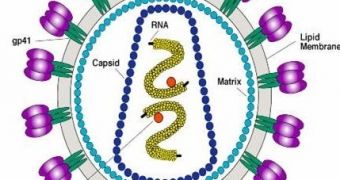For the moment, HIV is one step ahead of us, and with all the modern medicine, with its awesome scientific and technological achievements, there is no cure against HIV-infection. The best that can be done is to keep the virus at bay, stopping the outbreak of AIDS, but the virus remains stuck in the infected cells.
Now, a team from the Max-Planck-Institute of Molecular Cell Biology and Genetics in Dresden (MPI-CBG) and the Heinrich-Pette-Institute for Experimental Virology and Immunology (HPI) in Hamburg has built an enzyme that specifically targets the viral DNA and cuts it off from the host cell.
HIV inserts a DNA replica of its RNA genetic material into the human DNA of the infected cells permanently. The immune cells are now condemned to synthesize the HIV. The team led by Frank Buchholz from the MPI-CBG and Joachim Hauber from the HPI has now managed to specifically kick out the viral DNA from the infected cells. "We got rid of the virus from the infected cells; nobody has done this before", explained the researchers.
They got this by using a genetically engineered recombinase, an enzyme that functions like molecular scissors do. Recombinases are involved in cutting and pasting DNA stretches at specific sites. "Naturally occurring recombinases do not recognize viral sequences and are therefore not useful for an anti-viral approach. So we had to develop a recombinase that recognizes the viral sequence and removes the virus with precision." said Buchholz.
The team started with a recombinase naturally encountered in a bacteriophage (a virus that parasites bacteria). This particular enzyme, called "Cre", does not recognize HIV DNA stretches.
The research team managed in over 120 generation cycles to breed the mutated enzyme "Tre", which has the ability to detect HIV DNA. "Although Tre has so far only been tested in tissue culture cells, this work lays the technical foundation for a novel therapeutic approach that one day might be used to eradicate the HIV from cells of infected patients", Hauber said.
But we have to wait for a time till the new enzyme will be employed to cure HIV patients. "We will first go back to the bench to further improve the enzyme and then test whether the recombinase can be delivered efficiently and safely to cells in the human body", added the researchers.

 14 DAY TRIAL //
14 DAY TRIAL //